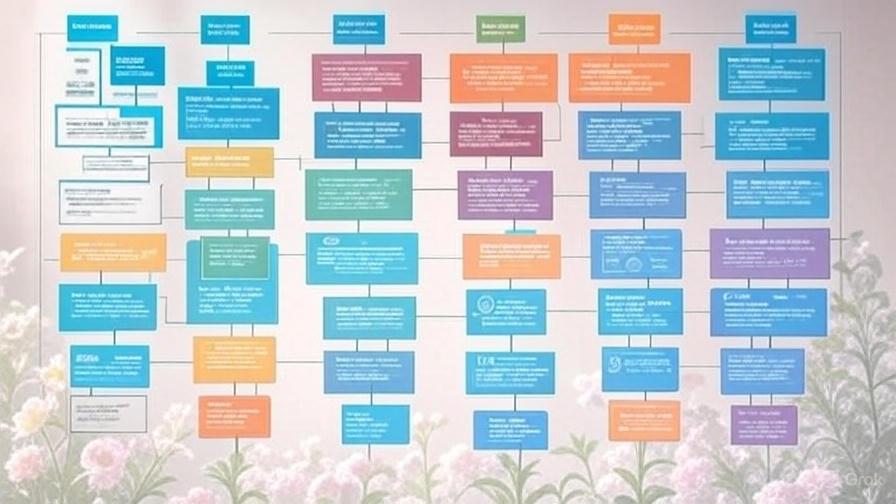Roadmap to Becoming a Full-Stack .NET Developer

Roadmap to Becoming a Full-Stack .NET Developer
Becoming a full-stack .NET developer is an exciting journey that opens up a world of opportunities in the software development industry. Whether you're just starting out or looking to expand your skill set, this roadmap will guide you through the essential steps and technologies you need to master. From understanding the basics of .NET to diving into advanced topics, we've got you covered. If you're eager to begin, consider enrolling in a net free course with certificate to get a head start.
Understanding the Basics of .NET
Before diving into the complexities of full-stack development, it's crucial to grasp the fundamentals of the .NET framework. .NET is a powerful platform developed by Microsoft that supports building and running modern applications. It provides a comprehensive ecosystem for developing web, mobile, and desktop applications.
What is .NET?
.NET is an open-source developer platform that you can use to create a wide variety of applications. It consists of tools, programming languages, and libraries that enable developers to build robust and scalable applications. The platform supports multiple programming languages, including C#, F#, and Visual Basic.
Setting Up Your Development Environment
To start your journey as a .NET developer, you'll need to set up your development environment. This involves installing Visual Studio, the integrated development environment (IDE) for .NET development. Visual Studio provides a rich set of tools and features that simplify the development process.
Learning C#
C# is the primary programming language used in .NET development. It is a versatile and powerful language that is essential for building .NET applications. Learning C# will provide you with a solid foundation for your full-stack development journey.
Basics of C#
Start by learning the basics of C#, including syntax, data types, control structures, and object-oriented programming concepts. Understanding these fundamentals will help you write clean and efficient code.
Advanced C# Concepts
Once you're comfortable with the basics, move on to advanced topics such as delegates, events, LINQ (Language Integrated Query), and asynchronous programming. These concepts are crucial for building complex and high-performance applications.
Exploring Front-End Technologies
Full-stack development involves working on both the front-end and back-end of applications. To become a proficient full-stack .NET developer, you need to master front-end technologies such as HTML, CSS, and JavaScript.
HTML and CSS
HTML (HyperText Markup Language) and CSS (Cascading Style Sheets) are the building blocks of web development. HTML is used to structure the content of web pages, while CSS is used to style and layout the content.
JavaScript and Front-End Frameworks
JavaScript is a powerful scripting language that enables you to create dynamic and interactive web applications. Familiarize yourself with popular front-end frameworks such as Angular, React, and Vue.js. These frameworks simplify the process of building complex user interfaces and single-page applications.
Diving into Back-End Development with .NET
With a solid understanding of front-end technologies, it's time to dive into back-end development with .NET. The back-end is responsible for handling the logic, database interactions, authentication, and other server-side operations.
ASP.NET Core
ASP.NET Core is a cross-platform, high-performance framework for building modern, cloud-based, and internet-connected applications. It is an essential tool for any full-stack .NET developer. ASP.NET Core provides a unified framework for building web applications and APIs.
Building Web APIs
Web APIs are crucial for enabling communication between the front-end and back-end of applications. Learn how to build RESTful APIs using ASP.NET Core. This involves understanding concepts such as routing, middleware, dependency injection, and authentication.
Database Integration
Databases are a critical component of any application. As a full-stack .NET developer, you need to be proficient in working with databases. Learn how to integrate databases into your .NET applications using Entity Framework Core, a powerful Object-Relational Mapping (ORM) framework.
Mastering Advanced Topics
To become a well-rounded full-stack .NET developer, you need to master advanced topics that will set you apart from the competition. This includes understanding cloud computing, containerization, and DevOps practices.
Cloud Computing
Cloud computing is revolutionizing the way applications are deployed and managed. Familiarize yourself with cloud platforms such as Microsoft Azure and Amazon Web Services (AWS). Learn how to deploy and manage .NET applications in the cloud.
Containerization with Docker
Containerization is a lightweight and efficient way to package and deploy applications. Docker is a popular containerization platform that allows you to create, deploy, and run applications in containers. Understanding Docker is essential for modern application development and deployment.
DevOps Practices
DevOps is a set of practices that combines software development (Dev) and IT operations (Ops). It aims to shorten the systems development life cycle and provide continuous delivery with high software quality. Learn about continuous integration and continuous deployment (CI/CD) pipelines, and how to implement them in your development workflow.
Building Real-World Projects
Theory and practice go hand in hand. To solidify your skills and gain practical experience, work on real-world projects. This will not only enhance your understanding but also provide you with a portfolio to showcase your abilities to potential employers.
Project Ideas
Start with simple projects such as a to-do list application or a personal blog. As you gain confidence, tackle more complex projects like an e-commerce platform or a social media application. These projects will challenge you and help you grow as a developer.
Contributing to Open Source
Contributing to open-source projects is an excellent way to gain experience and collaborate with other developers. It allows you to work on real-world codebases, learn best practices, and make a positive impact on the community.
Continuous Learning and Improvement
The field of software development is constantly evolving. To stay relevant and competitive, it's essential to embrace a mindset of continuous learning and improvement.
Staying Updated
Keep up with the latest trends and advancements in .NET development. Follow industry blogs, attend webinars, and participate in online communities. This will help you stay informed and adapt to changes in the industry.
Further Education
Consider enrolling in advanced courses and certifications to deepen your knowledge and skills. A dot net online course can provide you with structured learning and hands-on experience.
Conclusion
Becoming a full-stack .NET developer is a rewarding journey that requires dedication, hard work, and a passion for learning. By following this roadmap, you'll be well on your way to mastering the skills and technologies needed to succeed in this exciting field. Remember, the key to success is continuous learning and practical experience. Embrace the challenges, stay curious, and never stop learning. As you progress on your journey to becoming a full-stack .NET developer, keep pushing your boundaries and exploring new horizons.
What are the prerequisites for learning .NET development?
Before diving into .NET development, it's helpful to have a basic understanding of programming concepts and experience with any programming language. Familiarity with object-oriented programming principles will be beneficial.
How long does it take to become a full-stack .NET developer?
The time it takes to become a full-stack .NET developer varies depending on your prior experience, learning pace, and the amount of time you dedicate to learning and practice. On average, it can take anywhere from 6 months to a few years to gain proficiency.
What are the career prospects for full-stack .NET developers?
Full-stack .NET developers are in high demand in the software development industry. They can pursue various career paths, including software developer, web developer, application developer, and solutions architect. The career prospects are promising, with opportunities for growth and advancement.
Is it necessary to learn front-end technologies to become a full-stack .NET developer?
Yes, learning front-end technologies is essential for becoming a full-stack .NET developer. Full-stack development involves working on both the front-end and back-end of applications. Proficiency in front-end technologies such as HTML, CSS, and JavaScript is crucial for building complete and functional applications.
What are some popular front-end frameworks used with .NET?
Some popular front-end frameworks used with .NET include Angular, React, and Vue.js. These frameworks simplify the process of building complex user interfaces and single-page applications, making them valuable tools for full-stack .NET developers.
How can I gain practical experience in .NET development?
To gain practical experience in .NET development, work on real-world projects and contribute to open-source projects. Building your own applications and collaborating with other developers will provide you with hands-on experience and help you develop your skills.
What are the benefits of learning cloud computing for .NET developers?
Learning cloud computing is beneficial for .NET developers as it enables them to deploy and manage applications in the cloud. Cloud platforms such as Microsoft Azure and Amazon Web Services (AWS) provide scalable and reliable infrastructure for hosting applications, making them essential tools for modern application development.
What is the role of DevOps in full-stack .NET development?
DevOps plays a crucial role in full-stack .NET development by combining software development and IT operations. It aims to shorten the systems development life cycle and provide continuous delivery with high software quality. Understanding DevOps practices and implementing CI/CD pipelines is essential for efficient and effective application development and deployment.
How can I stay updated with the latest trends in .NET development?
To stay updated with the latest trends in .NET development, follow industry blogs, attend webinars, and participate in online communities. Engaging with the developer community and continuously learning will help you stay informed and adapt to changes in the industry.
Are there any certifications available for .NET developers?
Yes, there are several certifications available for .NET developers. Microsoft offers a range of certifications that validate your skills and knowledge in .NET development. Pursuing these certifications can enhance your credibility and open up new career opportunities.





